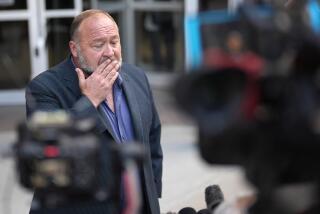Bid to Recoup Pre-Bankruptcy Payments Stalls : Courts: American Continental seeks to regain $24.5 million from creditors. Its attempt hinges on a similar case pending in the U.S. Supreme Court.
- Share via
A federal judge on Friday delayed for probably the rest of the year an effort by American Continental Corp. to recoup $24.5 million from creditors--mostly Southern California bondholders--who were paid just before the company entered bankruptcy two years ago.
U.S. District Judge Richard M. Bilby ruled in Tucson that proceedings in 2,100 separate lawsuits the company filed to recover so-called preference payments will be halted until the U.S. Supreme Court rules in a similar case, probably early next year.
The Phoenix company, through its bankruptcy trustee, had demanded that creditors who received more than $1,000 in the three months before the filing of bankruptcy return the money within 30 days after being served with the suits. Such preference payments are commonly sought in bankruptcy cases.
But Bilby’s order buys more time for several thousand small investors who were paid nearly $23 million in principal and interest before the company and its main subsidiary, Lincoln Savings & Loan in Irvine, collapsed in April, 1989. Lincoln is the nation’s biggest thrift failure to date, costing taxpayers an estimated $2.6 billion.
“I think it’s a very wise and fair determination by the court, and hopefully it will provide a little peace of mind to people who have had enough grief lately,” said lawyer Ronald Rus of Orange.
Rus is part of a group of lawyers who filed nearly two dozen lawsuits against the company’s owners, operators and professional advisers, charging that they defrauded thousands of bondholders out of more than $250 million.
But in the company’s preference lawsuits, nearly 90% of the small investors targeted had been paid in full before the company’s bankruptcy filing and were never part of the general bondholder suits.
William Rose, court-appointed attorney for American Continental, told Bilby that creditors had returned about $200,000 in preference payments already. The judge ordered him to hold the money in escrow in an interest-bearing savings account until further notice.
The judge also ordered a committee overseeing the company’s liquidation to try to come up with a smaller amount by Sept. 9 to settle the preference litigation.
Under a court-approved plan to liquidate American Continental, creditors who were paid during the three months before the April 13, 1989, bankruptcy filing could be forced to return the money so that the trustee could split it up among other creditors.
In mid-July, the company asked Bilby to halt any proceedings in the lawsuits it had been filing for three months to see if lawyers could reach a settlement. Bilby initially set a deadline of Aug. 31.
Lawyers for bondholders maintain that payments made before the bankruptcy filing were part of the company’s normal course of business and should fall under an exception to bankruptcy law on preference payments.
That issue is before the U.S. Supreme Court in a case involving ZZZZ Best Co. Inc., the Reseda carpet cleaning company that collapsed in 1987 in a fraudulent scheme that led to the conviction of its founder, Barry Minkow.
The U.S. 9th Circuit Court of Appeals ruled in the ZZZZ Best case that such payments are considered long-term debt and are not in the normal course of business, but three other circuit courts have ruled that such payments are normal and are exempt from preference rules.
Also on Friday, Judge Bilby approved a partial settlement of $1.665 million in one bondholder suit. The settlement for about 100 bondholders, primarily in the San Fernando Valley, was made by insurance carriers on behalf of the company’s directors and officers.
More to Read
Inside the business of entertainment
The Wide Shot brings you news, analysis and insights on everything from streaming wars to production — and what it all means for the future.
You may occasionally receive promotional content from the Los Angeles Times.










